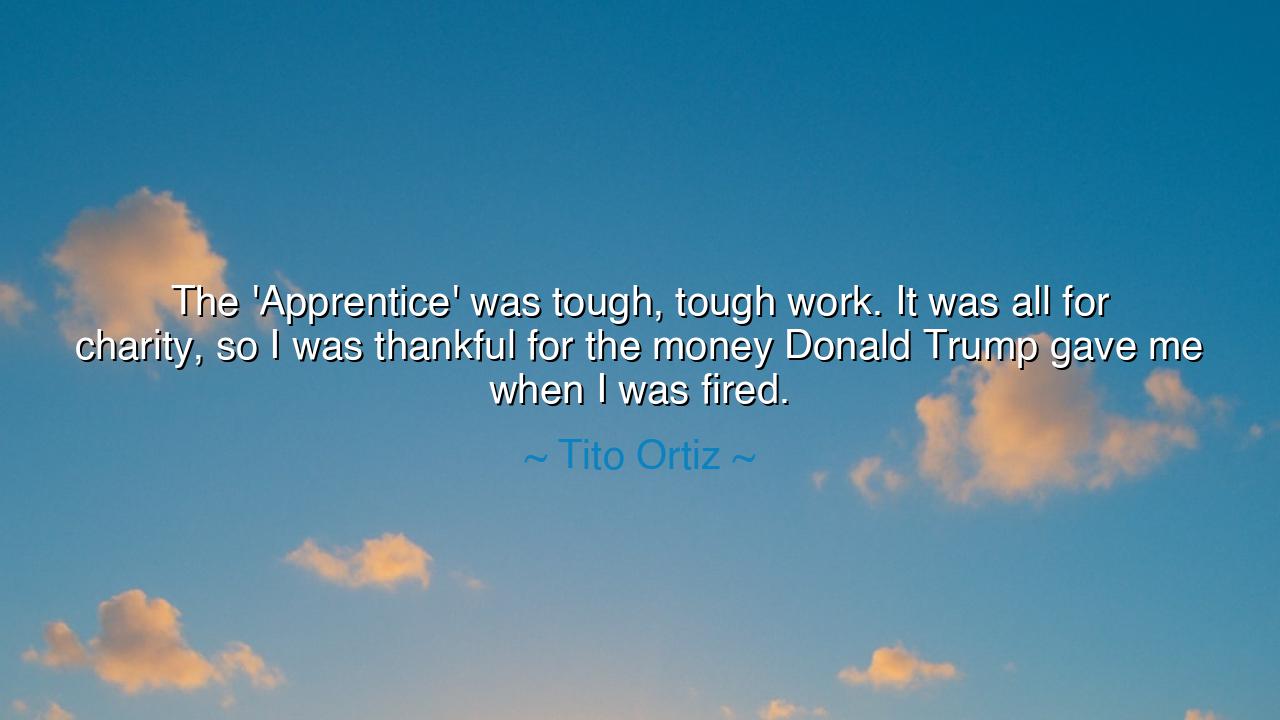
The 'Apprentice' was tough, tough work. It was all for charity
The 'Apprentice' was tough, tough work. It was all for charity, so I was thankful for the money Donald Trump gave me when I was fired.






When Tito Ortiz reflects, “The Apprentice was tough, tough work. It was all for charity, so I was thankful for the money Donald Trump gave me when I was fired,” he speaks as one who has fought not only in the arena of combat sports but also in the strange theater of business and entertainment. His words carry the humility of a warrior stepping into a foreign battlefield, enduring struggle not for personal gain, but for a cause greater than himself. They remind us that even in defeat, there can be honor, and even in loss, there can be gratitude.
The heart of this quote lies in the nature of work done for purpose. Ortiz emphasizes that the toil of The Apprentice was tough, yet his spirit endured because the end was for charity. To labor with exhaustion is one thing; to labor for others, for the powerless and needy, transforms the pain into something sacred. Thus, even when he faced dismissal—“fired,” in the harsh language of the show—his heart remained thankful, for the mission was never about his pride, but about the money given to those in need.
History is filled with examples where defeat still carried victory when the cause was noble. Consider Florence Nightingale, who endured exhaustion, criticism, and illness, yet her sacrifice was not for herself but for wounded soldiers who had no voice. Or reflect on Nelson Mandela, who suffered long years of imprisonment, yet counted his suffering worthwhile because it bore fruit for his people. Like Ortiz, they reveal that when the end is charity, even hardship and seeming loss are crowned with triumph.
Ortiz’s words also remind us of the paradox of defeat as opportunity. Though the game show’s structure demanded his removal, the act of being “fired” did not diminish his dignity. Instead, it brought forth the reward—money directed toward a cause that outlives the contest. To be thankful in such a moment is to see beyond self, to recognize that what matters most is not the verdict of men but the lives touched by the outcome.
There is also humility in his gratitude toward Donald Trump, who at the time presided as the host and arbiter of the show. Ortiz does not dwell on rivalry, nor does he lament his dismissal; he chooses instead to honor the gift that was given. Here lies a lesson in perspective: when we meet moments that seem bitter, we must learn to extract from them what is sweet, to see blessings even where pride may tempt us to see only insult.
The deeper wisdom of Ortiz’s statement is this: true victory lies not in personal glory, but in what is given to others. In his world of fighting, the focus was often on self—winning, dominating, conquering. Yet in The Apprentice, he discovered another form of combat: the struggle for causes, where even the sting of defeat can yield life-giving fruit for those in need. To be thankful for such an outcome is to understand the higher order of victory.
So I say to you, children of tomorrow: do not measure your worth by whether you win or lose in the eyes of men. Measure it by the good your struggle brings into the world. Even when dismissed, even when struck down, if your labor has lifted others, you have not lost. Be thankful in both triumph and setback, for when your cause is charity, no defeat can erase the nobility of your fight.






AAdministratorAdministrator
Welcome, honored guests. Please leave a comment, we will respond soon